- Home
- Iain Rob Wright
Hell on Earth- the Complete Series Box Set Page 3
Hell on Earth- the Complete Series Box Set Read online
Page 3
A tug at her arm pulled her away from her fears. It was David. “Get snapping, girl.”
“Yes, right.” Mina raised her camera and started snapping away, altering and fine-tuning her settings as she went. It was difficult to know how the best photograph would look until she examined the digital reel on her laptop, so she followed the photojournalist’s credo and just kept on snapping. The more pictures she took, the better the chances of getting something valuable. Different angles, different settings, different lenses, but just keep snapping.
David interviewed the police officers, scribbling away furiously on his notepad while they spoke. Usually he would use a tape recorder, but police officers were notoriously shy around recording equipment, and they gave much more away when faced with a simple pencil and pad.
While Mina tried to do her job, a pushy photographer from The Chronicle fought with her for the best angles, hustling her out of the way so often that it almost felt malicious. Mina knew she should hustle the older woman right back, but it wasn’t something she was used to. The other woman carried herself with such confidence and authority that it was hard to resist her. The police officers all smiled and chatted with her, while they had only disapproving glances for Mina. She started to wonder if she would ever find her feet in this job.
Satisfied that she had got as much as she was going to get, Mina placed her spare lenses back into her hip bag and let her camera hang around her neck. Now that she no longer stared through a viewfinder, the black stone in the centre of the cordon seemed to be alive—less a detached photographic subject, and more an imposing presence that demanded attention. From six feet away, she could see that the surface of it was not jet black, but streaked with delicate grey veins. She wondered what it would feel like if she touched it. It could kill her, she knew that, so why was she so eager to approach it? It was that same feeling she got whenever she stood on a high balcony and peered over the edge. That same voice in her head that always dared her to jump: Just do it!
A batch of shouting broke out behind Mina and made her turn around. The burly sergeant who stood outside the cordon had dropped his clipboard and had begun fighting with a lad in a red hoodie. A skinny girl batted the sergeant with both fists, yelling at him to leave her boyfriend alone. The profanity she used was impressive.
The sergeant applied a headlock, yanking the lad around. “I told you to bloody get back.”
The lad twisted and squirmed, trying to break free. “You have no right, pig! People deserve to know what’s happening!”
The sergeant released the lad’s neck and shoved him backwards. “Move away or I’ll bleedin’ place you under arrest.”
“Fuck you, pig,” the girlfriend shouted.
“Go suck a dick,” said the lad.
“Okay, that’s it.” The sergeant reached to his belt and pulled out a canister of CS gas. He pressed the nozzle and gave the young man a full dose in the face that sent him stumbling backwards, coughing and spluttering. The lad’s girlfriend screeched like a tomcat and pounced on the sergeant with her claws out. The sergeant restrained her easily with his meaty arm, and let her have a dose of the CS gas too. She fell to the floor weeping and scratching at her eyes.
The crowd ignited in anger. Hundreds of yelling voices merged into one, singular accusatory howl.
“Nazi!” somebody shouted.
“Fuckin’ pig,” came another.
The sergeant was on his radio, calling for backup, but before he got a call through, somebody threw a milkshake that exploded against his chest and covered him in pink mess. His face grew red with fury, and he started throwing punches at whoever was near. The lad in the red hoodie was pulled back by the paternal crowd, which then surged forward as a single, massive organism. Mina winced as she saw the same snarling racist who had called her Paki punch the sergeant in the face. The loud crack was like a cricket ball hitting a bat, but the stunned police officer remained on his feet and continued swinging his fists madly.
But it was a battle lost before it’d already begun.
The crowd dragged the sergeant to the ground, and the racist thug kicked his head like a football. Somebody else stamped on his testicles. Mina was glad the sergeant was unconscious through most of it. She was also glad that she had not confronted the racist. That could have been her head being kicked like a football.
The two police officers within the cordon raced to their colleague’s aid, but could not get near. The crowd was a pack of lions guarding its prey until it was well and truly dead.
“We need to go,” said David, clutching Mina’s arm.
“We need to help.”
“No! We need to get out of here before they do the same to us.”
Mina shook her head. “Why would they attack us?”
“Because we’re on this side of the cordon. Now come on.”
Mina allowed herself to be dragged, but found herself unable to take her eyes off the black stone. She got the feeling it was staring right back at her.
Police cars raced down Oxford Street, sirens blaring, but they had to stop when they encountered the thick mass of bodies. Within seconds, the squad cars tilted and rocked as people laid siege to the trapped officers. The windscreens cracked as people climbed up on the bonnets and, within seconds, the police cars had disappeared in a sea of bodies.
“This is insane,” said Mina. “They’re acting like animals.”
“Just keep moving, and don’t make eye-contact. Things are about to get nasty.”
“They’re already nasty.”
David grabbed her arm again and pulled her close. “People are afraid, Mina. And when people are afraid, their inner cavemen come out. There’s no rationality in a man when he panics. Just keep your head down and don’t stop moving.”
Mina dodged around an old woman who had fallen in the road. She wanted to stop and help her, but the crowd was a living thing, and swallowed the pensioner up before there was any chance to offer help. David dragged Mina beneath the awning of French Connection to catch a breath.
“What do we do, David?”
“We wait for the first gap in the crowd and then get the hell out of this city.”
“David, there are hundreds of those stones. What if this is happening everywhere?”
“There are thousands of them,” he corrected her. “You were there when Carol got the report. Thousands of them all over the world. I don’t think I understood the chaos they would cause until now. Hundreds of years ago, people’s superstitions kept them in line. Now, in the age of science, people don’t tolerate things they can’t understand. Until someone makes sense of these stones, things are going to get ghastly.”
Mina swallowed. “I’m afraid, David.”
“So am I, but there’ll be time to be afraid later. We need to get out of here.”
“And then what?”
“We give the public the news, and hope they don’t riot.”
~Tony Cross~
Iraq-Syria Border
The patch of scrub desert at the Iraq-Syria border was the worst hell British Army Staff Sergeant Tony Cross had ever visited—and he’d visited many. The air was so arid that it seemed to dry you out from within, and every breath was like swallowing sand.
And there was the isolation.
Nothing but sand, rubble, and rocks for a hundred miles in every direction. The nearest town was Rutba, but the people there were as frightened of British soldiers as they were of the fanatical members of the ISN—Islamic State Nationalists. They feared the West because they might be accused of being in league with terrorists, and they feared the ISN because they might be accused of being in league with the West. The ordinary people of Iraq were perpetual victims of religion and money, and neither served them well. Tony felt sorry for them in the same way he felt sorry for cows in the field—they didn’t realise how much their lives were not their own.
Lieutenant Ellis stood with his hands on his hips and stated the obvious, “Looks like this fence has been tampered
with.”
The gap in the border fence was twenty metres wide, and either end of it had been rolled aside so neatly that they resembled a pair of decorative pillars. Sabotage—but from which side?
“What are you thinking, Staff Sergeant?” Lieutenant Ellis asked Tony, no doubt noticing his dubious expression.
“How far away is the border crossing? Two miles? Three? The only way the Iraqi Guard didn’t notice a giant hole in their fence is because they’re either useless, or they’re letting the ISN stroll right on through.”
Ellis stiffened. “We can make no such assumptions. The Iraq national forces were trained by our soldiers. They know what is at stake.”
“Do they? To me their choice is pretty simple. Side with a group of men with the same religion and colour skin as them, or with a bunch of rich, white westerners with avarice behind their smiles.”
Ellis strolled up to Tony and lifted his chin in a way the pompous git probably thought was authoritative. “Now look here, Staff Sergeant, I will not have you criticising our operations here. You have made it quite clear your feelings on our duties in this part of the world—and since I have served nowhere near as long as you have I will reserve my judgement—but please keep your disenfranchisement to yourself. The men need not hear it. We are here to do a job, so leave the moral quandaries to the politicians.”
“That’s the last bunch of crooks I’d leave it to.”
Ellis placed his hands on his hips. “Am I understood, Staff Sergeant?”
“Perfectly, sir.”
“Good. We can be fairly certain that this is the ingress point from Syria into Iraq, so our mission is as planned. We set up here, and ambush the next group that tries to come through.”
“I don’t think that’s necessarily the best course of action, sir.”
“Oh? Why not?”
Tony told him, “The first set of rebels we fall upon might be a bunch of wet-eared kids. We should hold off until we identify a high value target.”
“And allow members of ISN to funnel through in the meantime? No, I’m afraid not. We are here to shut down this security breach for the Iraqi government and that is what we will do. We engage the first border-jumpers we see, and then get this fence repaired.”
Tony didn’t waste time arguing. This twenty-six year old, fresh out of Sandhurst Academy thought he knew everything and wouldn’t bend from what he thought best. He wasn’t the first arrogant little twerp to give Tony orders, and it was just part of the job. In the older days of war, Ellis might have got a bullet in the back, but those times were over. As they were carrying out a pretty low-risk mission in a conflict they were not officially involved in, Tony’s only concern was keeping the lads from doing mischief. Ellis could play the simpering peacock as much as he wanted.
Tony snapped off a half-arsed salute. “I’ll get the men dug in just behind that hill, sir. It’ll keep us well hidden until the time is right.”
“Excellent! See to it, Staff Sergeant.”
Tony marched away, leaving the Lieutenant to stand with his hands glued to his hips. The young officer’s expression made it look like he was planning a campaign to rival D-Day, but the truth was that there was probably very little going on inside his skull. With all the British Army’s great progress into the modern fighting force it was today, it was still top-heavy with entitled idiots from ‘military families’ and well-bred fools looking for a jolly old jaunt in the forces. The real leaders of the Army were the sergeants like him.
Tony flagged down one of his corporals, a young Scouser named Green. Like his name suggested, he was a little inexperienced, but he was also bright and eager—which counted for a lot out here in the wastelands.
“Yes, Staff Cross? Do you have orders?”
“Get four men and dig a defensive trench on the rear of that hill.” He pointed to the gentle slope that formed a moderate peak. “We’ll dig in with a lookout position at the top. We’ll see any border jumpers long before they see us. Have Corporal Rose help you.”
“Right away, Staff Cross.” Green marched away at the double, gathering men as he went.
There were fifteen of them assembled at the border, split off from a platoon of two hundred stationed at a temporary camp fifty miles way. Britain had decided not to take direct action in the Syrian conflict, or commit itself to any land wars, but it had compromised upon a small reactionary force to operate within ‘friendly’ Iraq. Any border jumpers could be dealt with as criminals, rather than terrorists, and that made things less politically precarious. After the decade-long nightmare of Al Qaeda, Britain did not want to draw the ire of another extremist group. It might have held an obligation to keep Iraq free of dangerous individuals, but it held no such responsibilities to Syria. Damascus could burn for all Westminster cared, so long as it was down to Syria’s people or Syria’s government. Tony didn’t particularly disagree. How could the Arab nations ever hope to evolve and pull themselves up out of the dirt if the West interfered every time a government was threatened? There would be no United States if some disenfranchised Brits hadn’t stuck their fingers up to the Crown. There would be no democracy in Britain if not for Cromwell and his armed uprising. People needed to overthrow governments and take control of their own destinies. The rest of the world should stand back and let them. The Arab Spring movement was the Middle East’s first step towards positive change. Worst thing to do now would be to try and manipulate things from Washington, London, and Brussels.
Not that Tony held any respect for the ISN. Like all fanatics, they were monsters hiding behind ideals and traditions—they deserved whatever they got—but it was for the Arab world to deal with them. Only through their own trials and triumphs would the people of the Middle East gain the confidence needed to unite against extremism and join the rest of the world on equal footing.
While Private Green carried out his orders, Tony took a trek up the hill to double-check that it was indeed a suitable location to stage an ambush. The elevation alone should give them the better end of a firefight, but it never hurt to know the terrain. For instance, as he strode up the gentle incline now, he noticed that the ground underfoot was loose. It would become tough to see if a sudden gust swept dirt up into the air. The last thing the men needed during a battle was a face full of sand. It might be worth building a windbreaker out of any larger rocks they could find.
So Tony set about looking for those rocks. There were numerous fist-sized boulders, but few that were large enough to provide cover. The unit had brought jeeps with them—hidden nearby under sandy tarps about half-a-mile back—so it was possible to make a quick reccy to see what lay in the surrounding area, but before he had properly considered doing that, he spotted a large stone up ahead. A jet-black boulder, completely out of place amongst the browns and greys of the desert.
In fact, it looked very much like it had been placed there.
Tony squinted and muttered to himself, “What the hell is that thing?”
“Incoming,” came a squawk through the radio.
Tony dropped onto one knee and swung his rifle up and around. Private Harris, a large brute of a man and the group’s lookout, pointed toward the Syrian border. Lieutenant Ellis rushed to the bottom of the hill and signalled the men to gather up, but as Tony was on higher ground, he stayed right where he was. Ellis realised that his Staff Sergeant was in a better position and instead rallied the men to Tony’s location.
“Who’s coming? How many? And which direction?” Tony asked Private Harris before Ellis had time to interject.
“Vehicles—I counted four. Three cars, one van.”
“Dear Lord,” said Ellis. “That’s quite the convoy.”
Tony faced his commanding officer with urgency. “We should get the men behind the hill and call it in to Command.”
“Yes, of course. Everybody, form a firing line behind the hill and await my orders.”
When the Lieutenant did nothing else, Tony frowned at him. “Are you going to call Command, sir?�
�
“No, it’s unnecessary until we know what we’re up against.”
“When we know what we’re up against it’ll be too late.”
“Nonsense. I don’t want to put a call through to Command without good reason.”
“There could be twenty armed men in that convoy.”
“Pah, twenty rebels against fifteen British soldiers. In an ambush no less.”
Tony gritted his teeth. He knew the Lieutenant wanted to call Command after successfully taking out a rebel unit so that he looked like a competent leader with initiative, instead of an officer who called everything in to get orders from above on how to proceed. “Fine,” Tony relented. “Let’s just be ready.”
The men scurried behind the hill and bedded down, spreading themselves out six feet apart and forming a well-spaced firing line. Closer to the top of the hill, Tony peeked over the crest to see what they were up against. It was bad.
Four cars and a van—not three as Private Harris had reported. If the vehicles were full of rebels, there would be a serious firefight. The ambush would have to be executed flawlessly, because if it became a protracted affair, there would be casualties on both sides. Tony got on his radio, the quickest way to speak to all fourteen men at once. “Everybody keep their ‘eds down ‘til either me or the Lieutenant give the word. When the shit hits the fan, we drop grenades on those vehicles and pin ‘em down with gunfire. Hit ‘em quick and hard enough and they’ll drop their weapons and surrender. Radio silence until then. Over.”
Tony remained at the top of the hill, pulling out his binocs and assessing the situation that was racing across the desert towards them. AK47 barrels protruded from the car windows like spines on a porcupine. The convoy was headed right for the breach in the fence, which meant they knew it was there. ISN rebels.

 Dark Ride
Dark Ride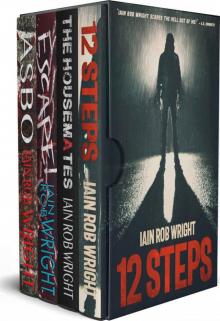 Gripping Thrillers
Gripping Thrillers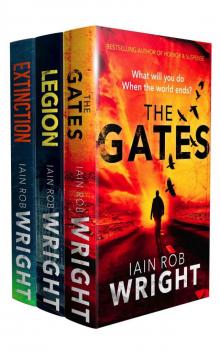 Hell on Earth Trilogy: The Complete Apocalyptic Saga
Hell on Earth Trilogy: The Complete Apocalyptic Saga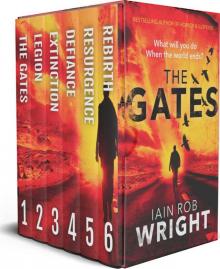 Hell on Earth- the Complete Series Box Set
Hell on Earth- the Complete Series Box Set Witch: A Horror Novel (The Cursed Manuscripts)
Witch: A Horror Novel (The Cursed Manuscripts)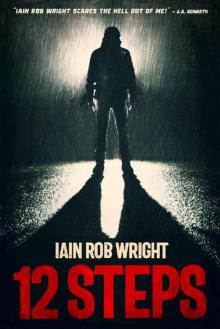 12 Steps
12 Steps A is for Antichrist
A is for Antichrist Blood on the Bar
Blood on the Bar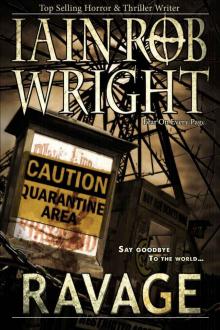 Ravage: An Apocalyptic Horror Novel
Ravage: An Apocalyptic Horror Novel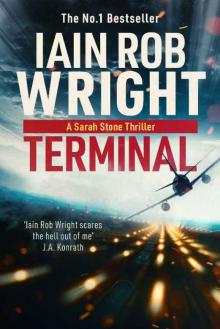 Terminal (Major Crimes Unit Book 4)
Terminal (Major Crimes Unit Book 4) Wings of Sorrow (A horror fantasy novel)
Wings of Sorrow (A horror fantasy novel) Blood on the Bar (Lucas the Atoner Book 1)
Blood on the Bar (Lucas the Atoner Book 1)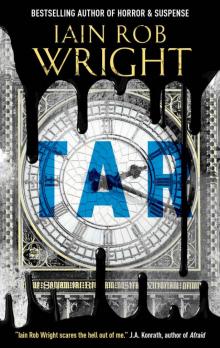 Tar: An apocalyptic horror novella
Tar: An apocalyptic horror novella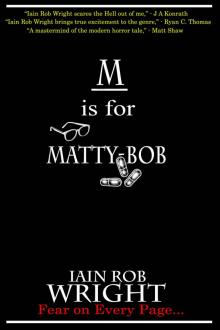 M is for Matty-Bob (A-Z of Horror Book 13)
M is for Matty-Bob (A-Z of Horror Book 13) Animal Kingdom
Animal Kingdom Animal Kingdom: An Apocalyptic Horror Novel
Animal Kingdom: An Apocalyptic Horror Novel Thrillobytes: bite-sized horror
Thrillobytes: bite-sized horror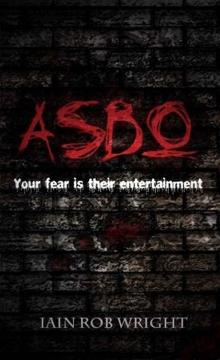 ASBO: A Thriller Novel
ASBO: A Thriller Novel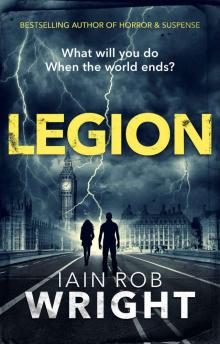 Legion: An Apocalyptic Horror Novel (Hell on Earth Book 2)
Legion: An Apocalyptic Horror Novel (Hell on Earth Book 2)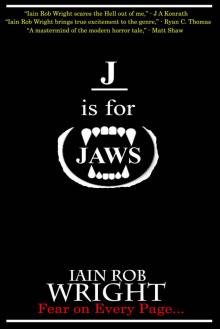 J is for Jaws (A-Z of Horror Book 10)
J is for Jaws (A-Z of Horror Book 10) E is for Exterminator (A-Z of Horror Book 5)
E is for Exterminator (A-Z of Horror Book 5)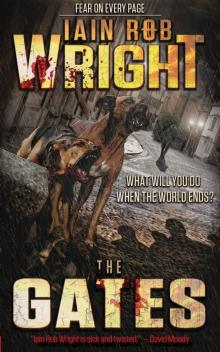 The Gates: An Apocalyptic Novel
The Gates: An Apocalyptic Novel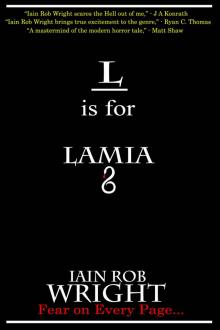 L is for Lamia (A-Z of Horror Book 12)
L is for Lamia (A-Z of Horror Book 12)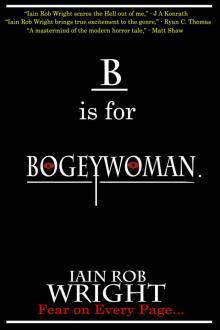 B is for Bogeywoman (A-Z of Horror Book 2)
B is for Bogeywoman (A-Z of Horror Book 2) G is for Genome (A-Z of Horror Book 7)
G is for Genome (A-Z of Horror Book 7)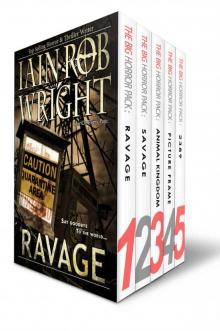 The BIG Horror Pack 2
The BIG Horror Pack 2 The Final Winter: An Apocalyptic Horror Novel
The Final Winter: An Apocalyptic Horror Novel The World's Last Breaths: Final Winter, Animal Kingdom, and The Peeling
The World's Last Breaths: Final Winter, Animal Kingdom, and The Peeling C is for Clown (A-Z of Horror Book 3)
C is for Clown (A-Z of Horror Book 3) Hot Zone (Major Crimes Unit Book 2)
Hot Zone (Major Crimes Unit Book 2)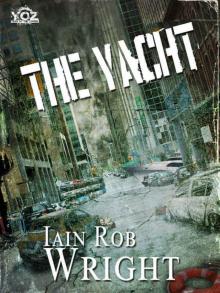 The Yacht (Year of the Zombie Book 3)
The Yacht (Year of the Zombie Book 3) Slasher: the Escape of Richard Heinz
Slasher: the Escape of Richard Heinz I is for Ice (A-Z of Horror Book 9)
I is for Ice (A-Z of Horror Book 9)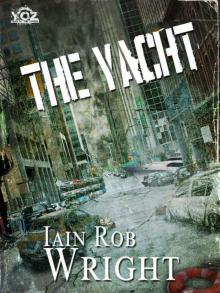 Year of the Zombie (Book 3): The Yacht
Year of the Zombie (Book 3): The Yacht The BIG Horror Pack 1
The BIG Horror Pack 1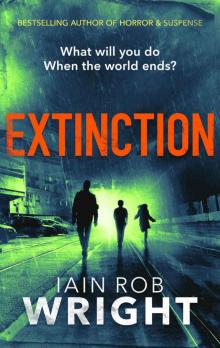 Extinction: An Apocalyptic Horror Novel (Hell on Earth Book 3)
Extinction: An Apocalyptic Horror Novel (Hell on Earth Book 3) Sea Sick: A Horror Novel
Sea Sick: A Horror Novel The Peeling Trilogy
The Peeling Trilogy The Housemates: A Novel of Extreme Terror
The Housemates: A Novel of Extreme Terror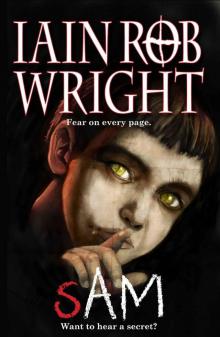 Sam
Sam